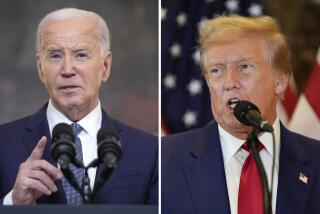Tyrants on trial
This week, the trials of two overthrown dictators resume, one at The Hague, where former Yugoslav President Slobodan Milosevic faces charges including genocide, the other in Baghdad, where Saddam Hussein is accused of massacring nearly 150 Shiites.
Both have challenged the legitimacy of the court that is trying them.
Milosevic decries the âso-called tribunalâ as a sham exercise in victorsâ justice bankrolled by the North Atlantic Treaty Organization, which waged war against his government in the 1990s.
Appearing on the stand last month, Hussein denounced âthis so-called courtâ and declared himself Iraqâs rightful leader.
The parallels between the two trials arenât coincidental. While awaiting trial, the former Iraqi president read the Geneva Coention and reportedly monitored Milosevicâs legal proceedings.
The two dictatorsâ insubordination in the courtroom is part of a larger legal strategy to undercut each courtâs authority and to assert their claims to power. Their actions expose a fundamental problem in war-crimes justice. Although the courts can adequately assess and weigh charges, they are poorly equipped to handle direct challenges to their authority.
The Milosevic trial has been a drawn-out battle involving a defiant dictator, cumbersome bureaucratic procedures, awkward multilingual interpretations and proceedings that offer many opportunities to challenge its institutional authority. Some critics contend that the tribunalâs distance from the scene of the alleged crimes -- nearly 900 miles -- undercuts its legitimacy in the eyes of Serbs back home. The fact that the trial lumbers on four years after Milosevicâs ouster doesnât help matters either. Others, however, say all this ensures justice.
Either way, Husseinâs trial offers a counter-example. Located in the former headquarters of Husseinâs Baath Party, the courtroom is surrounded by a 10-foot-high blast wall and patrolled by dogs, Humvees and a tank. Iraqi reaction to the televised trial has been mixed. With car bombs exploding just miles from the courtroom, the trial is at the center of the U.S.-led effort to establish the rule of law in Iraq. The question is whether Iraqis will perceive it as legitimate.
The Milosevic trial offers some lessons, and Hussein isnât the only student. Before Husseinâs trial, judges on the Iraqi High Tribunal were briefed on Milosevic as a case study of how not to try a former dictator.
Trained as a lawyer, Milosevic exploits any opportunity to reject the courtâs authority. He tweaks judges by calling them âmisterâ rather than âyour honor.â He frequently rolls his eyes. He corrects the interpretersâ translations. And these tactics have worked.
Last year, when the court named two attorneys to conduct Milosevicâs defense because of his poor health, he and his witnesses refused to cooperate. Within two months, the lawyers were forced to resign in part because they could find no witnesses willing to testify. After almost 300 days of presenting evidence, the prosecution showed no âsmoking gunâ linking Milosevic to the alleged atrocities. Now Milosevic has the stage to present his defense.
To avoid this kind of embarrassment, the Iraqi High Tribunal established different ground rules.
First, it is not an international entity but an Iraqi court on Iraqi soil whose rules are drawn from both international and Iraqi law. Its code of conduct is modeled on United Nationsâ tribunals but consistent with Iraqi law. It has the power to issue the death penalty.
Second, the trialâs scope will be narrow. Unlike Milosevic, who is charged with 66 counts of war crimes in Kosovo, Croatia and Bosnia-Herzegovina, Hussein and his co-defendants are specifically charged with killing the Shiites in northern Iraq in 1982. The hundreds of thousands of deaths Hussein allegedly caused dwarf that crime, but the court, in recognition of the Milosevic debacle, went with its strongest evidence.
Finally, only Iraqi judges will question Hussein, and he cannot represent himself.
But before these challenges can begin, unanticipated problems continue to crop up. Two defense lawyers have been assassinated, and Husseinâs team had refused to participate in the proceedings before Iraqi officials authorized bodyguards for it last week.
Witnesses are also afraid. According to the trialâs lead judge, proceedings were postponed last month because the nearly 40 people scheduled to appear were too scared to testify.
The resumption of the dictatorsâ trials comes just days after the 60th anniversary of the Nuremberg trials, the exemplar of war-crimes justice. In some senses, the Milosevic tribunal has already failed to live up to the Nuremberg standard because the Serbian public still does not support it. On the fourth anniversary of Milosevicâs extradition last June, a large crowd turned out to protest his âkidnapping,â and a recent poll in Serbia showed that Milosevic is more popular than the countryâs current prime minister.
The Iraqi High Tribunal cannot afford to fall short of the Nuremberg ideal if the rule of law is to be established and recognized as legitimate in Iraq.
More to Read
Sign up for Essential California
The most important California stories and recommendations in your inbox every morning.
You may occasionally receive promotional content from the Los Angeles Times.










